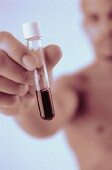- Double Mastectomy May Offer No Survival Benefit to Women With Breast Cancer
- Toxic Lead Found in Cinnamon Product, FDA Says
- Certain Abbott Blood Sugar Monitors May Give Incorrect Readings
- Athletes Can Expect High Ozone, Pollen Counts for Paris Olympics
- Fake Oxycontin Pills Widespread and Potentially Deadly: Report
- Shingles Vaccine Could Lower Dementia Risk
- Your Odds for Accidental Gun Death Rise Greatly in Certain States
- Kids From Poorer Families Less Likely to Survive Cancer
- Tough Workouts Won’t Trigger Cardiac Arrest in Folks With Long QT Syndrome
- At-Home Colon Cancer Test Can Save Lives
Counseling With HIV Testing May Not Help Prevent Future STDs


TUESDAY, Oct. 22Contrary to what experts have believed, briefly counseling people who take a rapid HIV test on how to reduce their risk for sexually transmitted diseases (STDs) is not effective, a new study shows.
Counseling for these at-risk patients did not reduce the incidence of STDs up to six months after patients were tested for HIV, the study found. A more focused approach to providing information at the time of testing may be needed, the authors said, since counseling requires valuable resources of time, money and personnel.
“Overall, these study findings lend support for reconsidering the role of counseling as an essential adjunct to HIV testing,” study author Lisa Metsch, at Columbia University’s Mailman School of Public Health, and colleagues wrote in the Oct. 23 issue of the Journal of the American Medical Association.
“This inference is further buttressed by the additional costs associated with counseling at the time of testing: Without evidence of effectiveness, counseling cannot be considered an efficient use of resources,” they added.
In the United States alone, about 50,000 new HIV infections occur every year, according to a journal news release. The U.S. Preventive Services Task Force recently recommended that all people aged between 15 and 65 be screened for HIV (which causes AIDS).
The researchers randomly assigned about 5,000 patients treated at nine STI clinics in the United States to receive either brief patient-centered HIV risk-reduction counseling along with a rapid HIV test, or the rapid HIV test with information only and no risk-reduction counseling.
Patients who were counseled received advice on their specific high-risk behaviors and concrete steps they could take to reduce their risk for STDs. The researchers assessed STDs among the patients when the study began and again six months after they had their HIV test.
Both men and women were tested for gonorrhea, chlamydia, syphilis, genital herpes and HIV, along with Trichomonas testing for women.
During the study, the STD incidence was 12.3 percent in the counseling group and 11.1 percent in the information-only group. The researchers noted that their findings were consistent at all nine STI clinics and after taking into account the patients’ age, sex, race and ethnicity.
However, counseling is vital for patients who are indeed found to have HIV, the researchers emphasized.
“Post-test counseling for persons testing HIV-positive remains essential, both for addressing psychological needs and for providing and ensuring follow-through with medical care and support,” they wrote. “A more focused approach to providing information at the time of testing may allow clinics to use resources more efficiently to conduct universal testing, potentially detecting more HIV cases earlier and linking and engaging HIV-infected people in care.”
More information
The U.S. Department of Health and Human Services has more about sexually transmitted diseases.
Source: HealthDay
Copyright © 2024 HealthDay. All rights reserved.










